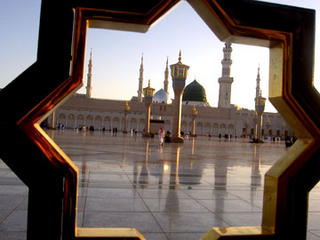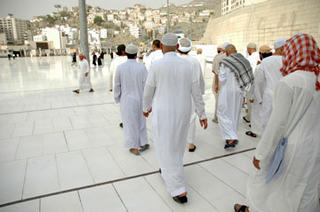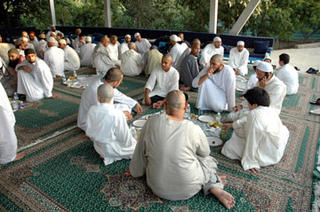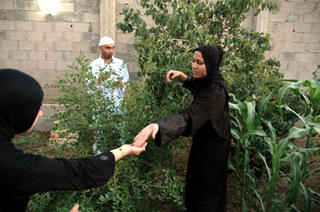An opening in the house of Allah
 Photo: Worshippers saying their last duas and their farewell to the Prophet (saw) outside his mosque. © Fareena Alam. Please do not re-use without permission and proper credit.
Photo: Worshippers saying their last duas and their farewell to the Prophet (saw) outside his mosque. © Fareena Alam. Please do not re-use without permission and proper credit.Although the entire Rihla had a significant effect on me, I believe each one of us had that one epiphany that we will probably remember for the rest of our lives.
I had expected a whirlwind of emotions, but I was not prepared for the intensity of them. I don’t think I could have sufficiently prepared for what I felt when I first saw the green dome, when I first walked toward the Masjid un Nabawi, during my first prayer there, and definitely not for what I felt in the Rawdah. Subhanallahil Adheem. And this was just in Madinah. What was to come in Makkah was a whole different story.
When departing Madinah for Makkah, the weather had taken a turn, and was overcast with the threat of rain. Although there was no downpour, I felt a drizzle on my face, and I’d like to think that I was fortunate enough to catch a few drops of blessed Madina rain. After seeking the Prophet’s (صلي الله عليه و سلم) permission to leave his blessed city, it hit me, how attached I had become to this beautiful place in a relatively short space of time. As we rolled out, I caught my last glimpse of the green dome, and unable to hold back tears, I sought comfort in the words of the beautiful farewell dua…..
At some point during the journey, my sadness turned into excitement and slight nervousness as I turned my thoughts to Makkah and what was yet to come. Labbayk Allahumma Labbayk…
My first glance at the Kaaba... Subhanallah, the tears just stopped and I felt like someone had reached into my chest and gripped me tightly. It took a few seconds for the du’a to start pouring out, but when they did, I felt like I could stand there all night….They say the duas made when a person first sees the Kaaba are always accepted.
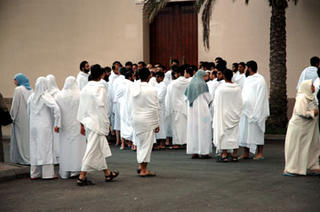 Photo: The rihla group stop at the miqat to make their intention for umrah. © Fareena Alam. Please do not re-use without permission and proper credit.
Photo: The rihla group stop at the miqat to make their intention for umrah. © Fareena Alam. Please do not re-use without permission and proper credit.Before I knew it, I had completed ‘Umrah, Alhamdulillah. It was only after this that I started to feel things I had never imagined that I would feel at the House of Allah.
I had expected to feel a heightened sense of awe in Makkah, compared to Madinah, which I did initially, but anxiety and a strange fear took over me. I just wanted to go and sit in a corner away from everyone, like a frightened child. I was deeply disturbed by this reaction, as every other person I spoke to was in complete awe of the place, and loved it. I made dua to Allah to let me realise the reasons for my discomfort at His house. I began to worry that my heart had been blackened so much by sins and hypocrisy that I was incapable of feeling close to Allah even at His sanctuary.
In the quiet of my hotel room, I was still reeling from what I had experienced at the Haram. Sleep was out of the question, and I began to think about the difference between Madinah and Makkah. My mind took me back to the Rawdah, the peace I felt there, the gratitude, the humility.
Then it dawned on me…
Madinah reminded me of Jannah and Makkah, of the Day of Judgement!
Memories of Madinah were filled with the presence of the Prophet (صلي الله عليه و سلم), his closest sahaba, his family; and prostrating in Riyadhul Jannah, an actual piece of Paradise, and all those warm, welcoming feelings.
The scenes I had witnessed in the Haram in Makkah were reminiscent of what I had learnt about the Day of Judgement. During tawwaf, I witnessed people circling the Kaaba at different paces, some struggling, some running, others walking, calling out to Allah in different languages, different tones, some crying, some shouting as if in desperation, some reciting as if in a trance, people hanging onto the Kaaba door as if their lives depended on it, people pushing, pulling, climbing on top of each other to get to the black stone…..
During sa’ee, I noticed the muffled wailing of people in sujood, and those rocking back and forth in a daze, calling out to Allah, some with their hand raised high.
Between Safa and Marwa, some pilgrims were sweating profusely and I remembered the description of Yamul Qiyamah, where people will be sweating, some up to their knees in it, others drowning in it.
At the top of each of the mounts, I saw children bringing cool water to their exhausted parents, and once again it reminded me of the Day when children who had died before puberty will be looking for their parents amongst the chaos and confusion to give them a cool drink.
Strangely I felt a huge sense of relief, which was quickly replaced by gratitude. I was so grateful to Allah for that experience, even if it represented only a tiny fraction of the reality of the Last Day. Since coming to Islam, I had belief in the Day, but this was the closest I had ever come to believing in the reality of it, and for me this was an immense opening.
After this realisation, the rest of my experiences at the Kaaba were awesome, and I wanted the images to burn into my memory, so that when I returned home, and tried to make those sacrifices that would bring me closer to Allah, the memories of the 'reality' of the Day of Reckoning would hopefully make them easier.
A. M.
